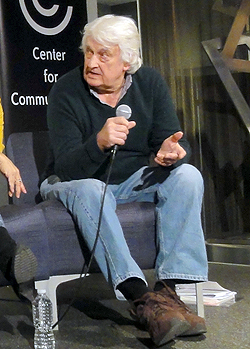“I’m not interested in making money. I just want to be a journalist,” said a starry-eyed Fordham University freshman during the Q&A following last night’s Center for Communication panel discussion at NYU’s Arthur L. Carter Journalism Institute.
Her words must have heartened the hearts of the journalism professors who served as the session’s panelists.
 |
Optimistically tagged “Journalism: Bullish on the Future?,” most of the content was a warmed-over stew of the countless means of expression triggered by the dawn of the golden age of the Internet.
George Brock, one-time reporter of the august Times of London, assured the mostly student crowd that the wretched downsizing of traditional media is business-as-usual.
To him, mainstream journalism enjoyed an unusual stretch of tranquility before being brought to its knees by the Internet. Brock sniffed “serious journalism never had a vast audience.”
Other panelists simply chose to keep their rose-tinted glasses in place. Sheila Coronel, professor and director of professional practice in investigative journalism at Columbia University, suggested specialization is the way to go. She said the New York Times will hire a graduate fluent in Russian and plunk her down in Moscow.
In Coronel’s world, the exciting world of financial journalism beckons for anyone who can understand Wall Street. Left unsaid -- the massive layoffs at the Old Gray Lady, who has been selling everything she didn’t own that wasn’t the New York flagship.
A stroll through New York’s now residential-heavy downtown Financial District gives one a good feel about the future of the financial press. That’s hardly bullish. As for the financial press, Forbes’ future is reduced to peddling native advertising and paying staffers per-hit. Malcolm must be spinning in his grave.
Veteran journalist Peter Pringle, former foreign correspondent of The Sunday Times, The Observer and The Independent, provided the panel’s sole sobering dose of reality. He challenged whether the Buzzfeed brand has much credibility in the world beyond the insular and navel-gazing world of journalism. He told how he once got off a plane in Nicaragua and called up the president’s office to request an interview. Pringle got an hour face-to-face meeting with his man.
One panelist predicted years from now Buzzfeed may have similar clout to what the London Times once had. But for now, Buzzfeed, which has been hiring reporters, still gets its viewership from junk like cats’ videos. That may be fine entertainment for many, but it’s hardly journalism.
Panelists suggested the audience’s future is in blogs. “Stick around for while and see if the site starts covering news,” was a recommendation. Brock, who was flogging his just out “Out of Print” book, mentioned The Gothamist as a site, attempting to transition to news. Asked if Gothamist staffers are paid a fair wage with health benefits, Brock said he wasn’t sure, then snarkily added that staffers looked well fed. That line summed up the night.
Pringle, at one point, pointed out the journalism professors on the panel, have a conflict of interest in talking about the future of journalism. But you can’t blame them for pitching the unlimited prospects of the web. After all, they have a bill of goods to sell and bills to pay.
But it’s the naivety of journalism students that’s inexcusable. At the very least, a J-student is expected to have a curiosity about the real world. They are entering a field in which Pew Research Center’s latest state of the media report released March 26 trumpets the fact that online news organizations created 5,000 jobs, less than a third of the jobs lost in traditional newsrooms.
If J-students can afford to either struggle financially or be willing to sponge off wealthy parents for the next decade to see if sites like Buzzfeed emerge as a respected news source, godspeed and good luck in school. However, people in the reality world need a paycheck.
Six years from now, that enthusiastic Fordham student may receive a rude awakening. Though Fordham University may find it hard to forgo her annual $60K tuition and room & board tab, the Jesuit school (like all J-programs) has the moral responsibility to set her straight about future job prospects -- right now.


 Trump Media & Technology Group today reported a $58.2M net loss on $4.1M in 2023 revenues, a disclosure that drove its stock price down 22.6 percent to $47.96.
Trump Media & Technology Group today reported a $58.2M net loss on $4.1M in 2023 revenues, a disclosure that drove its stock price down 22.6 percent to $47.96. Barry Pollack, an attorney at Wall Street’s Harris St. Laurent & Wechsler, has registered Julian Assange as a client with the Justice Dept. “out of an abundance of caution.”
Barry Pollack, an attorney at Wall Street’s Harris St. Laurent & Wechsler, has registered Julian Assange as a client with the Justice Dept. “out of an abundance of caution.” Paramount Global to slash 800 jobs in what chief executive Bob Bakish calls part of an effort to “return the company to earnings growth"... Rolling Stone editor-in-chief Noah Shachtman is exiting at the end of the month due to disagreements with chief executive Gus Wenner over the direction the magazine is taking... The New York Times broke the $1 billion barrier in annual revenue from digital subscriptions in 2023... Press Forward is investing more than $500 million to strengthen local newsrooms.
Paramount Global to slash 800 jobs in what chief executive Bob Bakish calls part of an effort to “return the company to earnings growth"... Rolling Stone editor-in-chief Noah Shachtman is exiting at the end of the month due to disagreements with chief executive Gus Wenner over the direction the magazine is taking... The New York Times broke the $1 billion barrier in annual revenue from digital subscriptions in 2023... Press Forward is investing more than $500 million to strengthen local newsrooms. The majority of news articles are read within the first three days of publication, according to a recent report.
The majority of news articles are read within the first three days of publication, according to a recent report. The Los Angeles Times gives pink slips to 115 people or 20 percent of its newsroom staff... TIME is also laying off about 30 employees, which is approximately 15 percent of its editorial staff... The Baltimore Banner, which was launched by Stewart Bainum in 2022 after he failed to buy the Baltimore Sun, added 500 subscribers per day in the three days following Sinclair Broadcast Group's deal to purchase the Sun.
The Los Angeles Times gives pink slips to 115 people or 20 percent of its newsroom staff... TIME is also laying off about 30 employees, which is approximately 15 percent of its editorial staff... The Baltimore Banner, which was launched by Stewart Bainum in 2022 after he failed to buy the Baltimore Sun, added 500 subscribers per day in the three days following Sinclair Broadcast Group's deal to purchase the Sun.


 Have a comment? Send it to
Have a comment? Send it to 
No comments have been submitted for this story yet.